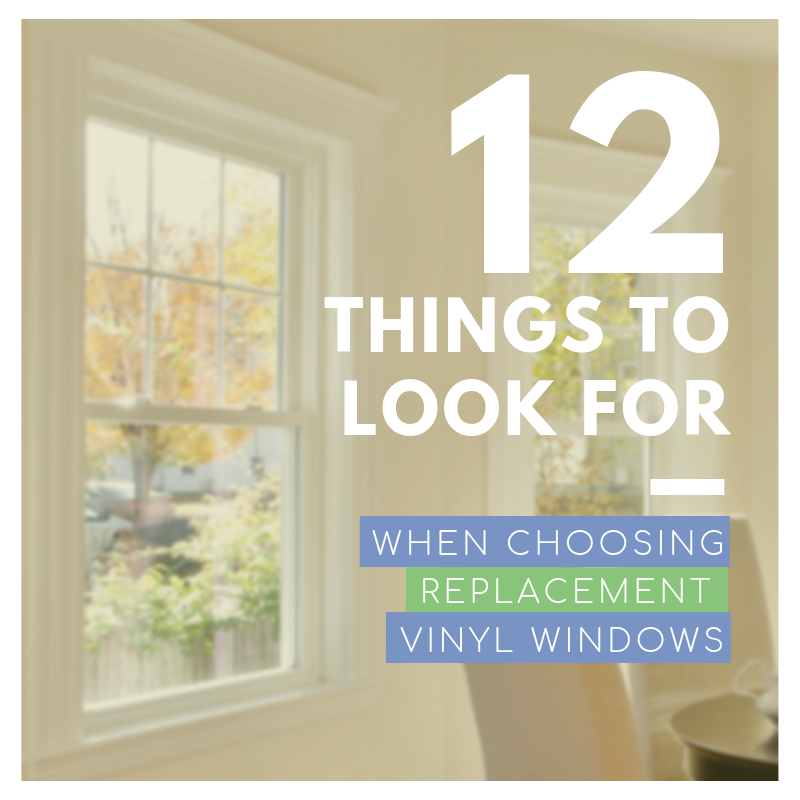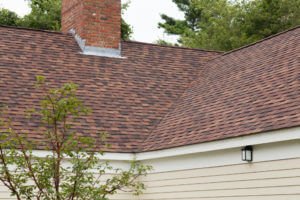
12 Things To Look For When Choosing Replacement Vinyl Windows

Are you looking to replace your homes old windows with new vinyl windows? There are several important factors to consider when choosing vinyl windows, so that you make the right choice for your home and family, while getting the maximum value for your money.
1. Low-Emissivity
Low-Emissivity or low-E improves the glass energy-efficiency by about 30%. Low-E coat is a very thin, transparent coat on the glass that reflects heat and ultraviolet radiation while also letting light in.
2. U-Factor Rating
The U-Factor rating, also known as U-Value, indicates how well a window product inhibits heat from escaping. The lower the U-Factor number, the better the window is at resisting heat flow and the better its insulating properties. U-Factor rating typically ranges from 0.20 and 1.20. Be on the lookout for the U-Value number when choosing your replacement windows.
3. Energy Star Certification
Energy Star® endorsement, a U.S. government program, shows the mark of energy efficiency, which ensures high performance while saving on energy costs. Energy Star® guidelines help increase the energy efficiency of the windows they endorse. When shopping for replacement vinyl windows, look for the Energy Star® label. Manufacturers of window brands must meet the energy efficiency criteria in order to qualify for Energy Star® certification. The window brands must have a U-Factor rating of 0.30 or less.
4. Whole Window Values
You have to be certain that the U-Factors you are comparing have “whole window” values. With Energy Star®, it is obligatory that heat transfer measurements should be taken at 20 places on the window frame and glass. Some manufacturers of vinyl windows may display a “center-of-glass” rate, which makes their window seem more energy-efficient than it actually is. If you suspect the U-Factor to be too low, you can ask to see the “whole window” rating.
5. NFRC Label
National Fenestration Rating Council (NFRC) label breaks down the energy performance of your replacement window, helping you compare the energy-efficiency of window products. Manufacturers under the NFRC program must label every window with its thermal performance ratings. Know the numbers and what they mean for your replacement vinyl windows. The NFRC label shows the U-Factor, and the Solar Heat Gain Coefficient (SHGC), which measures the interior heat generated by sunlight through the window and how well the product can resist any unwanted heat gain. The higher the SHGC number, the more heat from sunlight which keeps the house warm in the winter and vice versa, which means less efficient cooling in the summer.
6. Double or Triple Pane Glass
As the names imply, double and triple pane glass have two or three layers, respectively, of glass panes, unlike single-pane glass. Double pane glass has a pane of glass on the outside and one on the inside with a compact of air in between the two panes to help insult from the cold. Triple pane glass, however, has an additional layer of glass that creates a second air pocket, which translates into an even more insulated window. The thicker glass units also enhance noise reduction.
7. Gas Fill
Gas fills provide about nine times more insulation for replacement vinyl Windows. The addition of argon or krypton gas between the two panes of glass ensures improved thermal performance. Replacing the air within with argon or krypton gases minimizes the convection currents within the pocket space between the glass, thereby reducing the heat transfer between the inside and outside by up to 20-to-30%. However, Krypton’s insulating properties are slightly better than argon but tend to be more costly.
8. Titanium Dioxide
The titanium dioxide in high quality replacement Vinyl windows makes the window more heat resistant. In addition, the compound brightens a white vinyl window while also protecting it from future discoloration from the sun’s rays. It also reacts with the UV rays for easy cleansing. Some manufacturers use the cheaper method of tinting to save the color. Notice a pale blue tint to the white vinyl? That’s a sign that the tinting method was used.
9. Frame Width
The glass system of a window determines its quality, as about 80% of a window is glass. Lower quality vinyl windows come with a noticeably wider window frame, meaning less glass and less sunlight into your home. Higher quality windows, on the other hand, come with thinner frames, allowing for more glass area with good energy-efficiency ratings.
10. Measurement
In fixing your replacement vinyl window, the measurement must be right. This is a very crucial factor because if a window is a bit too large, it will become strained resulting in the loss of its structural strength with time. On the other hand, when the window is a bit too small, there will definitely be small gaps, which will adversely affect the insulating ability of the window. To be on the safer side, it’s best to hire a qualified expert to install the windows properly.
11. Welded Frame
Even though vinyl windows cost less when the window frames are mechanically assembled and screwed together at the corners, they tend to loosen and lose their firmness over time. But when you desire a more lasting, stronger vinyl window, choose the high quality vinyl windows manufactured with a “fusion welded frame”.
12. Warranties
Warranties are definitely important. Check that the manufacturer, as well as the window installation company, endorses the window’s warranty and that the window installer installs the window by the manufacturers standards. If not installed per the manufacturers standards, the window warranties can become void. Look into the workmanship warranty that the installation company provides, as well, and if they are a certified installer of the window manufacturer. Carefully read through to ensure that the warranty covers the whole purchase price rather than a depreciated amount. And if possible, make sure that the warranty is fully transferable if you decide to sell the property in the future.
Aside from the above factors, it’s important that you check out the background of any replacement window companies before you decide to work with them. Do they have great reviews and a solid rating on the Better Business Bureau and Angie’s List? Are they licensed and certified by the window manufacturer? Will they work with you and provide honest feedback? Above all, do your due diligence before choosing the right installer for your windows.
Get helpful tips in your inbox
We send one email per month – that's it. Our goal is simply to help you navigate the world of home repairs.

